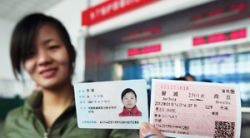Difference between revisions of "Real-name identification system"
imported>Ciic m (Protected "Real-name identification system" ([edit=sysop] (indefinite) [move=sysop] (indefinite))) |
imported>Ciic |
||
| Line 1: | Line 1: | ||
| − | [[file:Real-name identification system 实名制.JPEG|thumb| | + | [[file:Real-name identification system 实名制.JPEG|thumb|250px|Real-name identification system 实名制]] |
China has developed its '''real-name identification system''' ('''实名制''') over the past few years and the system requires that people show their valid identification cards (ID), documents or information when processing business or bank transactions. | China has developed its '''real-name identification system''' ('''实名制''') over the past few years and the system requires that people show their valid identification cards (ID), documents or information when processing business or bank transactions. | ||
Revision as of 03:11, 12 June 2012
China has developed its real-name identification system (实名制) over the past few years and the system requires that people show their valid identification cards (ID), documents or information when processing business or bank transactions.
In 2010, China's railway authorities began implementing the system on a trial basis with Guangzhou Railway (Group) Corp. and Chengdu Railway Bureau with the aim of tackling the problem of illegal ticket scalping during the annual Spring Festival travel rush.
Since June 1, 2010, China Railway High-speed (CHR), the high-speed rail system operated by the country's Ministry of Railways, adopted the real-name identification system as an integral part of its ticket-selling process. The system was expanded to include tickets sold across China's entire train network from Jan. 1, 2012. Tickets can be purchased a maximum of 10 days in advance through the real-name identification system.
